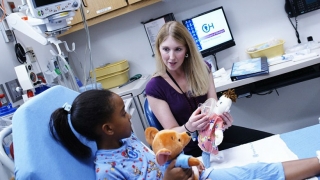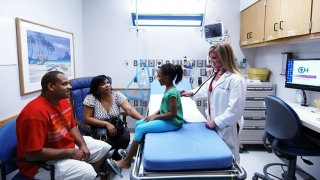Small Bowel Obstruction Repair
About the procedure
Surgical repair of a bowel obstruction is usually performed in the first days of life, as soon as your baby is stabilized.
During the operation, the surgical team will make an incision in your child's abdomen so that they can examine the stomach and intestines and locate the blocked part of the small intestine. They will open up the blocked end of the intestine and connect it to the area of small bowel just past the blockage. This is called resecting and anastomosing the bowel.
Minimally invasive surgical techniques are also available at CHOP, and this may be a potential option for your baby. Your surgeon will discuss all options with you.
Recovery after the operation
After surgery, your child will be transported to the N/IICU for recovery. Post-surgical treatment is focused on getting your child’s bowel to regain function so that it can operate on its own.
Here's what else to expect after surgery:
- Incision: Your baby will have thin strips of tape — called STERI-STRIPS — and a special glue called DERMABOND over the incision. The STERI-STRIPS or DERMABOND will fall off in 1 to 2 weeks.
- Pain relief: Your child will get pain medication as she needs it. When she first comes back to her room after surgery, she may need narcotic medication such as morphine or Versed. She'll get these through an intravenous (IV) line.
- Holding your baby: As soon as your baby is stable, you can begin to hold her with the assistance of the nurse.
- Feeding and nutrition: In the post-operative period, your baby will continue on intravenous nutrition until her bowel has a chance to heal from the surgery. This may take days to weeks. She'll get needed fluids, as well as antibiotics to prevent infection, through her IV. Your child may have a small feeding tube placed into her nose and passed through her stomach, past the surgical site, so that she can be fed through the tube until the surgical site heals. Feeding will begin once specific criteria are met:
- NG tube drainage will be a small amount and clear in color
- Your baby passes stool
Caring for your child at home
Your child will be discharged from the hospital when she is able take in enough feeding volume to provide good nutrition, and is gaining weight.
Once your child comes home, she may have formula or breast milk. Learn more about follow-up care and the benefits of breastfeeding babies with small bowel atresia.
Two weeks after discharge, you'll need to take your child for a follow-up appointment with her surgeon.
When to call the doctor
Please call your child's doctor if:
- Your child develops a fever greater than 101 degrees F
- Your child isn't urinating as often as usual (decreased number of wet diapers)
- Your child is vomiting and not tolerating feedings
- Her incision begins to look red, swollen or otherwise infected

